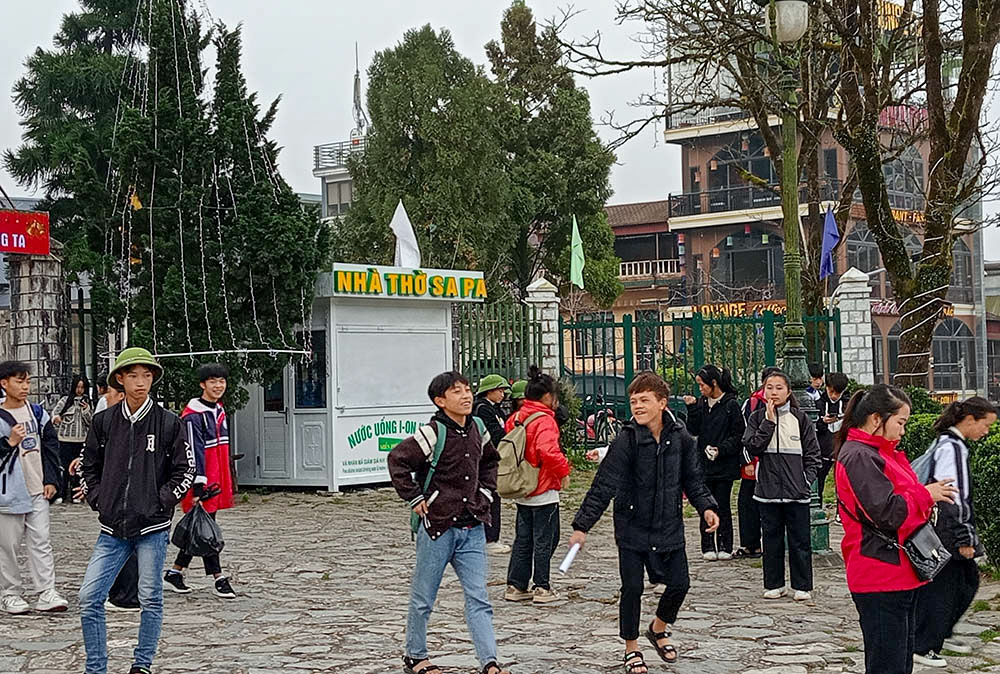
Hmong students from the Sa Pa Parish-run hostel head to school in cold weather on Dec. 12, 2023, in Sa Pa town, Vietnam. (Joachim Pham)
Hmong ethnic Joseph Ma A Lau, 25, and Therese Giang Thi Xu, 22, in their traditional clothes, held their marriage ceremony at Sa Pa Church on Jan. 4.
Their ceremony was attended by 170 married couples who celebrated the 5th, 10th and 15th anniversaries of their marriages, and 40 other couples whose marriages had not been regularized by the church since they were under legal marriage age.
Those couples from four Hmong-dominated parishes of Hau Thao, Lao Chai, Sa Pa and Su Pan in Sa Pa town of the northern province of Lao Cai attended the first-ever gathering to observe the feast of the Holy Family of Jesus, Mary and Joseph.
Lovers of the Holy Cross of Hung Hoa Sr. Mary Hoang Thi Phuong said, "We are absolutely delighted that Lau and Xu qualify for a formal ceremony because they refuse to follow their Hmong's age-old custom of child marriage."
Phuong said Bishop Dominic Hoang Minh Tien of Hung Hoa Diocese formally performed their ceremony as a way to encourage local ethnic people to abandon the rampant child marriage practice and only get married when they reach legal age.
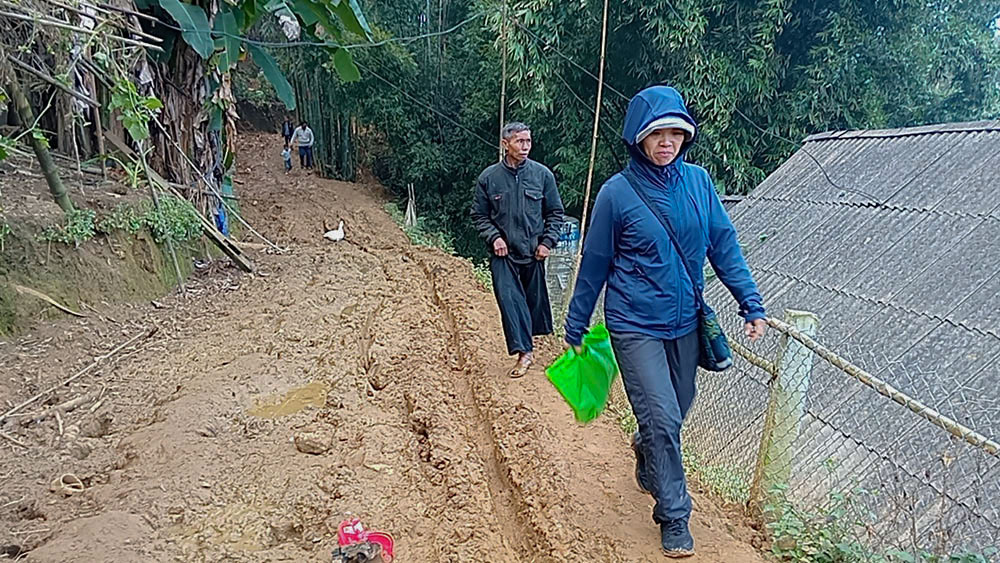
Sr. Mary Hoang Thi Phuong, a member of the Lovers of the Holy Cross of Hung Hoa, walks on a muddy path to San 2 Mission Station in Sa Pa town of the northern province of Lao Cai, Vietnam, on Dec. 10, 2023. (Joachim Pham)
The nun, who started to work with local people in 2003, said most of those Hmong couples at the gathering got married and had children when they were still teenagers. They have only been regularized in the church since 2006 when the first priests were assigned to this area.
The 2019 national census conducted by the General Statistics Office showed the average marriage ages among ethnic groups were 17.5 and 15.8 for men and women, respectively. Vietnam's 53 ethnic groups had 14.1 million people, accounting for 14.7% of the country's population.
However, the country's law requires men to be 20 years old and women 18 to get married legally.
The census found 583,297 cases of child marriage in 2019 in 14 northern mountainous provinces, more than those in other regions. Among them, Lao Cai province alone recorded 56,939 cases.
The region is home to Hmong and 30 other ethnic groups.
The rate of child marriage among the Hmong people, with a population of 1.4 million, stood at 51.5%, the highest among the 53 ethnic groups. They had a poverty rate of 52.7%.
Lau from Hau Thao Parish, founded in 1926 by foreign missionaries, said that, by tradition, Hmong women aged 13-14 are "kidnapped" by their boyfriends at ages 16-17, and their families hold wedding parties for them.
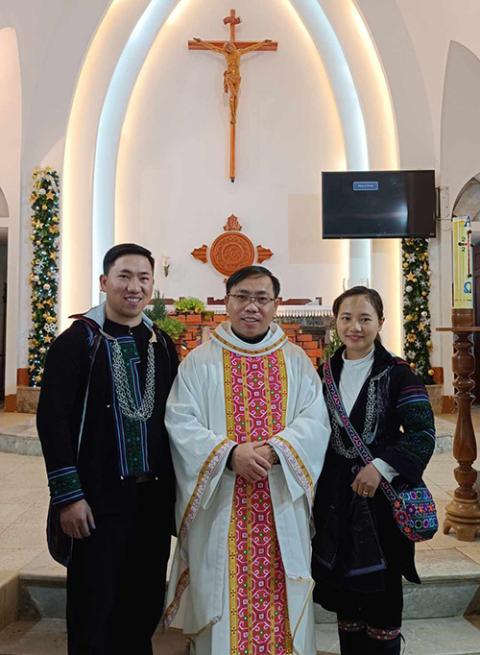
From left, Joseph Ma A Lau, Fr. Joseph Ma A Ca and Therese Giang Thi Xu pose for a picture after their wedding ceremony at Sa Pa Church on Jan. 4. (Courtesy of Joseph Ma A Lau)
He said the practice deprives them of their childhood, and they have no opportunities to study, grow fully and enjoy life.
He said his parents married when they were teenagers and had 10 children. They toil on farms but still suffer from a lack of food for several months a year. His siblings dropped out of school to look after one another and work to support the family.
"There is a close relationship between child marriage, poverty, illiteracy and reduced quality of life, a vicious circle," he said.
The man, who works as a tour guide and singer for a living, said, "We are very pleased that we get married lawfully and have jobs to support our own family."
His wife, Xu, completed high school and works for a hotel in Sa Pa town. They plan to hold a wedding party in February.
Lau, who graduated from the University of Culture based in Hanoi, attributed their success to the nuns who taught them catechism, offered them accommodation to study further, and encouraged them to obey laws and steer clear of child marriage.
Phuong, who serves Lao Chai Parish and four subparishes, said the couple is a shining example for local people to phase out their old custom of child marriage.
She noted that it is not easy for Hmong people, who get married early to have more people to cultivate crops, to stop their custom in a short time.
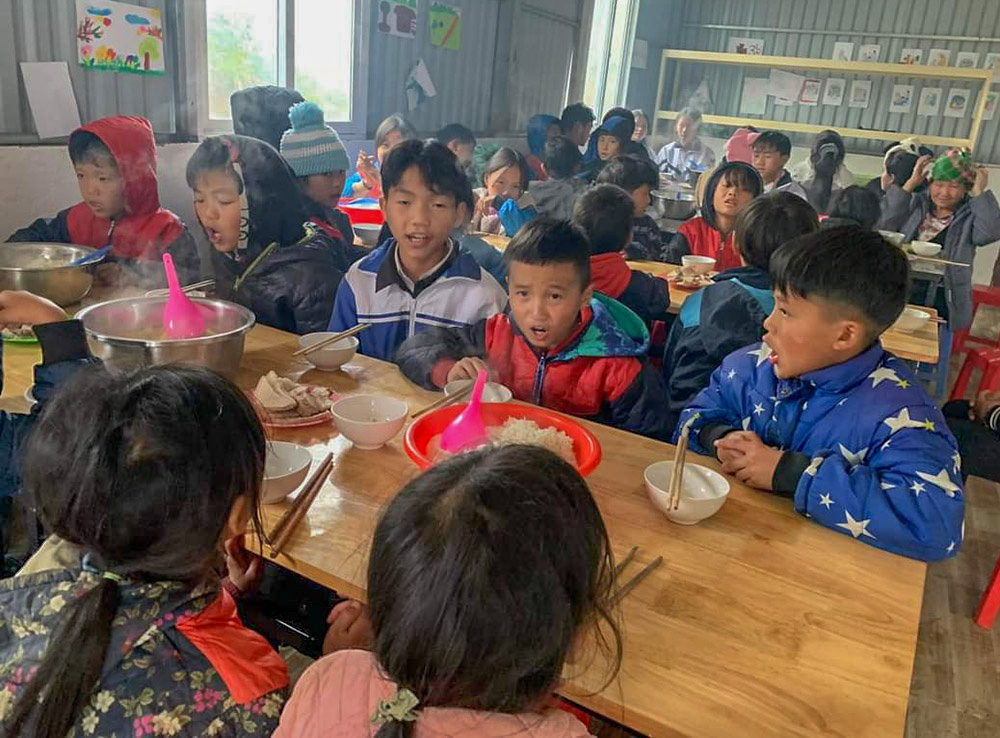
Hmong children have lunch prepared by Sr. Mary Hoang Thi Phuong at Ban Phung Chapel after their catechism class. (Courtesy of Sr. Mary Hoang Thi Phuong)
"We try to educate young people on marriage values and gender through catechism classes and urge them to give top priority to studies and living skills rather than marriage for a better life. We hope that many of them will avoid child marriage by entering high schools and colleges, living away from home and developing healthy relationships with their friends," she said.
Phuong, 48, said she and two other sisters based at Lao Chai Church hold catechism classes for hundreds of students at 10 subparishes and mission stations 25-40 kilometers away. The nuns, who travel by motorbike on narrow, muddy and windy paths, feed them after classes so they can attend Mass before returning home.
She said they also run summer courses in catechism for couples who married below the legal age, already had two to three children and have reached the legal age, so that they can have their marriages regularized in the church. Those couples bring their children to the class as no one else takes care of them.
Advertisement
The nuns, who stay at the parish house since they have no convent, also look after 20 children aged 1-3 on the weekdays so that their parents cultivate crops for a living.
St. Paul de Chartres Sr. Maria Nguyen Thi Su and another sister run a hostel for 70 high school students from Hmong families. The hostel was founded in 2006 by Fr. Peter Pham Thanh Binh, who was assigned to Sa Pa Parish in 2006.
"We offer free accommodation to the ethnic students so that they can finish high school and enter colleges and vocational centers as a way to improve their education," Su said.
She said they study at public schools, attend daily Mass and are taught how to solve problems and balance their emotions to avoid child marriage.
She said that although some leave school for marriage, the rest do not get married until completing high school when they are at least 18 years old. Dozens of high school graduates also pursue religious vocations at various congregations.
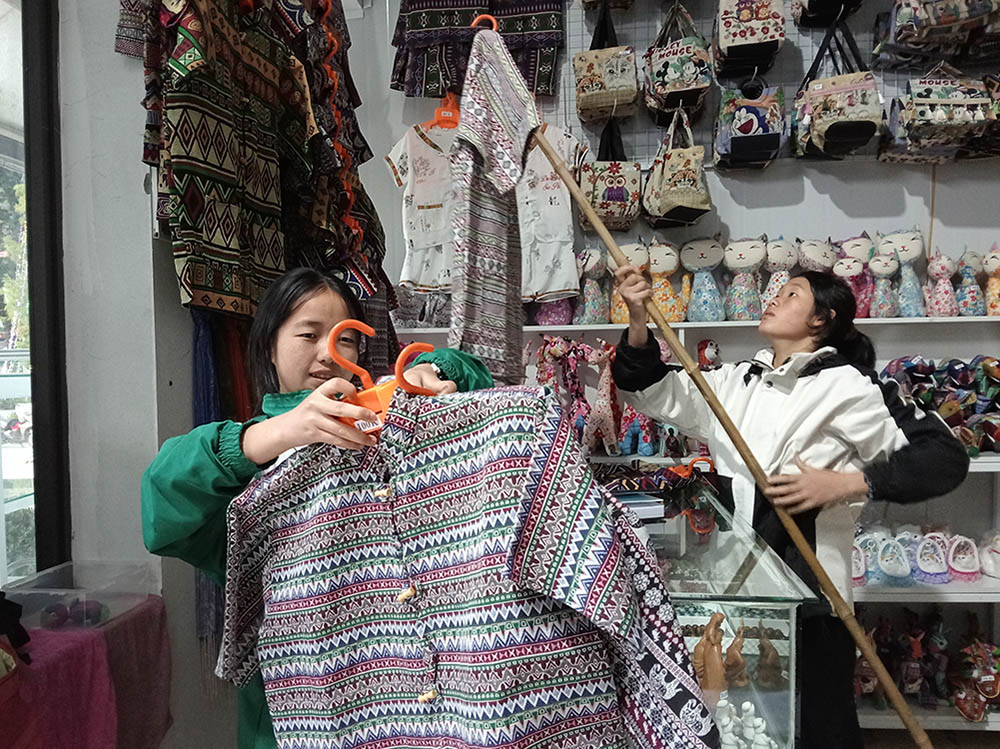
Teresa Thao Thi Bau (left) and another student sell clothes and souvenirs at a shop in the compound of Sa Pa Church in Sa Pa town of the northern province of Lao Cai, Vietnam. (Joachim Pham)
Teresa Thao Thi Bau, an 11th grader who lives at the hostel, said she is grateful to the nuns who provide her with free material support to pursue her studies.
Bau, who has seven siblings, said, "I would drop out of school and be abducted as a wife by young men if I was not sent to the hostel."
She said that, after school, she joins a choir, cleans facilities and works at a souvenir shop in the compound of Sa Pa Church.
Teresa Lo Thi Dung, a seventh grader, attends a catechism class offered by Lovers of the Holy Cross Sr. Mary Tran Thi Minh. Twenty students take the class on Sundays at Lao Chai Church.
"The sister also teaches us how to keep personal hygiene, dress properly, perform well at school and stay clear of child marriage that will deprive us of our childhood and future," Dung said.
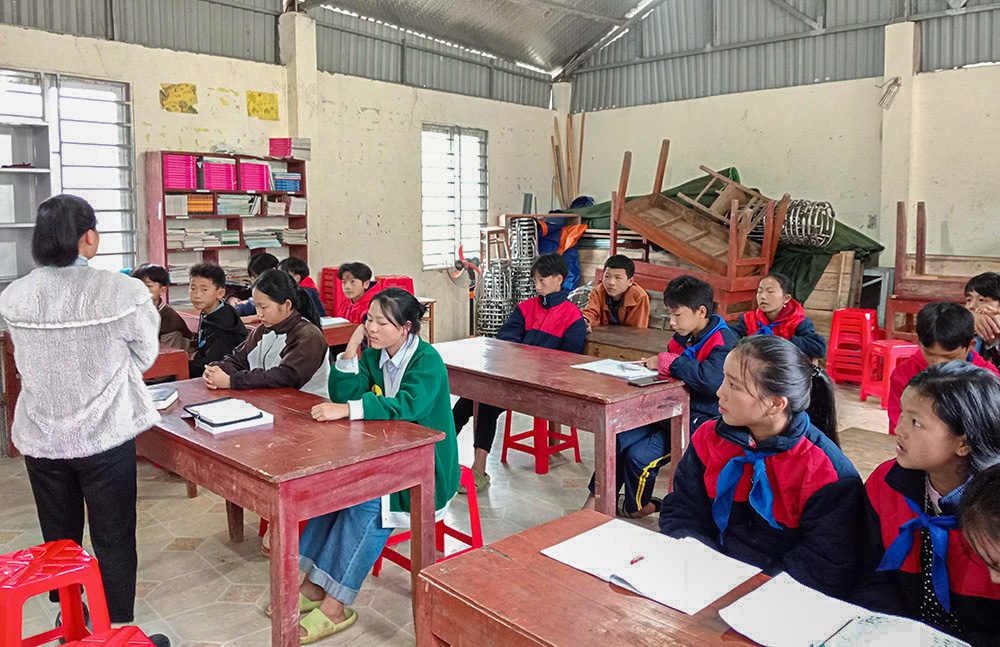
Teresa Lo Thi Dung (first row, second from right) and other students attend a class taught by Lovers of the Holy Cross Sr. Mary Tran Thi Minh at Lao Chai Church in Sa Pa, Vietnam, on Dec. 9, 2023. (Joachim Pham)
"I am determined to study further so that I can become a teacher in the future to educate children from my village," she said.
Therese Giang Thi Dy from San I Subparish, with 280 members, said she married her husband when she was 15 years old, and they have seven children. Their marriage was just regularized in the church in 2010.
Dy, 42, said some of her children participate in church activities run by the nuns so "they are confident in their ability to control their life."
The farmer said she is happy that her three daughters, 20-24, are still single and work at hotels and restaurants in Sa Pa town for a living.
"They work hard to support themselves and enjoy their life. They do not want to live in poverty like us, so they change their minds about marriage. That's good," she said.
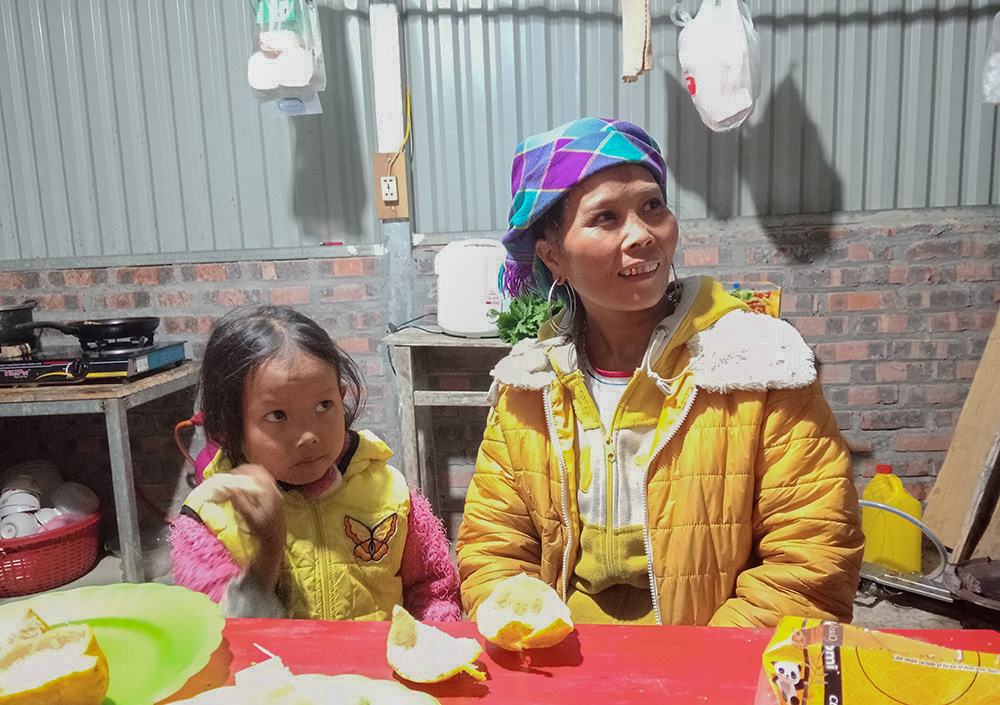
Therese Giang Thi Dy prepares food for children at San I Subparish in Sa Pa town of the northern province of Lao Cai, Vietnam, on Dec. 9, 2023. (Joachim Pham)
Lovers of the Holy Cross of Hung Hoa Sr. Mary Do Thi Trang said that 10 nuns and six priests serve 5,000 Hmong and 550 Kinh from four parishes of Hau Thao, Lao Chai, Sa Pa and Su Pan, and 16 subparishes and mission stations in Sa Pa district. Local Catholics had no resident priests for 60 years due to wars and later religious restrictions since 1948.
Trang said, "Our efforts come to fruition with an average of 30 couples per year who reach legal age, complete compulsory courses in catechism, have no children and formally celebrate their marriage ceremonies in local churches in recent years."
She said some 70 other couples with child marriage are legalized by the church each year. Most of them have reached marriage ages and had children.
Michael Lo A Khoa, head of the Lao Chai Parish council, said, "We are happy that many couples of legal age celebrate their wedding ceremonies in churches that never took place before."
"Only when our material and spiritual life improves will we gradually abandon the child marriage custom," he said.




